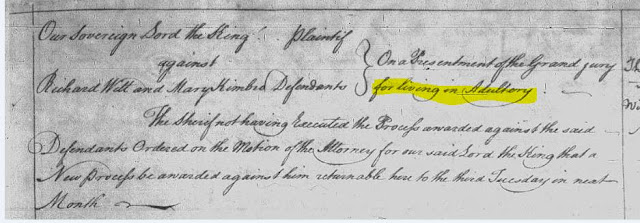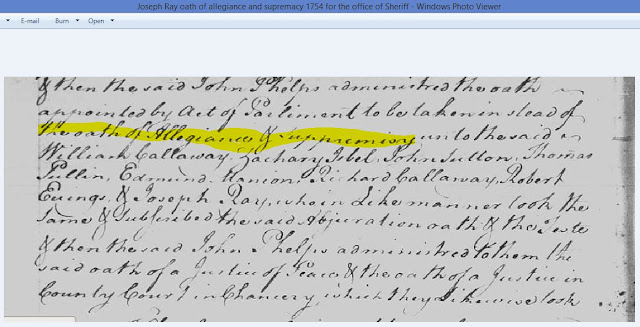I've been paging through Virginia court order books now that they are searchable from anywhere online at FamilySearch.org. These books can be found by searching by county. Researching in these books often requires keeping up with boundary changes when new counties were formed. I found this interactive map showing boundary changes very helpful at Rootsweb.
(You need to be signed in to unlock these books at FamilySearch).
I've found both lists of jurors and roadwork lists of men to be good census substitutes. This is especially helpful before 1782 in Virginia when the most complete tax lists are available.
Certain kinds of cases seemed to be handled all at the same time and are listed together. I found a string of adultery cases listed together and a bunch of cases against people hiding tithes handled on the same day.
Some of the indexes to court orders aren't complete, and sometimes names were badly misspelled so it's a good idea to page through the books to find everything. It's also a good idea to read through the books to get to know the names of neighbors and learn more about the history of the area. I discovered a many times great-uncle had travelled to Williamsburg (the colonial capital or Virginia) which was a long distance from Bedford County, Virginia. When I visited Williamsburg I wondered if any ancestors had been there. My ancestor Moses Wray served as a constable, in Bedford County, Virginia, and I would never have known that without the order books.
There are transcriptions of court order books for some counties but like the indexes they are often incomplete. The order books cover thousands of pages and the transcriptions are generally only hundreds of pages. One such book is "An Old Virginia Court: Being a Transcript of the Records of the First Court of Franklin County, Virginia, 1786-1789, with Biographies of the Justices and Stories of Famous Cases" by Wingfield.
Examples of Order Book entries:
Roadwork entry :
Jury duty:
Jury duty lists are useful in determining if ancestors were in an area at a particular time.
Imported into country from Great Britain or Ireland:
I found this to be very interesting. Some men came to court regarding exercising importation rights to land they were entitled for immigrating to the colonies. I found a possible ancestor named Henry Morris who was imported from Great Britain.
Deed Proven in Court:
I found a gift deed mentioned in court orders that doesn't appear in the deed books. Some deeds proven in court apparently are not in the deed books.
Military:
I've found a number of Revolutionary War related entries.
Wives of soldiers were sometimes mentioned and given rations to live on. Below the wife of a prisoner of war received assistance.
Lists of people who supported the military with food supplies and other necessities can be found in the order books.
Miles Traveled to Courthouse:
This can be useful for separating people who have the same names.

Taxation:
Some people were brought to court for hiding tithables.
Someone might be mentioned in court orders if they were added to the tax lists such as Joseph Ray below.
When someone was exempted from paying taxes because of age or another reason that fact would sometimes be recorded in court orders .My ancestor Moses Ray, or Wray, was exempted due to age. This gives us a hint regarding his age.
Church Entries:
Looking at these entries I discovered my family lived in the Russell Church of England Parish in Bedford County, Virginia. If a vestry book could be located I might find more family information.
Vestry men and churchwardens belonged to the Church of England. These men often appear in court order books.
Not attending church could lead to a person being punished during the colonial period before a relaxing of laws against non conformists.
Wolves heads:
A bounty was paid for killing wolves.
Whippings:
A "negro" man was whipped for burning the whipping post down.
Orphans:
Churchwardens would bind out orphans.
African Americans:
Slave children were often brought to court to determine their age.
Children orphaned if their parents were free would be bound out by churchwardens just like white children.
A free person could have their status questioned and show up in court orders. Below Thomas Coleman is in court defending his free status. His freedom was confirmed by the court.
Women in Court Orders
Women's names can be found in court orders. They sometimes appeared in court as witnesses, or mentioned in estate cases, or giving up their dower rights.
Women often came to court when their husbands died in order to settle his estate.
Living in Adultery;
Oaths to King:
Anyone holding an office in Colonial America had to swear the Oath of Allegiance and Supremacy to the King. They would take the oath in court.
Brands:
Brands were sometimes recorded in court orders.
Poorhouse lists:
Sometimes poor house lists were included. The one below gives the occupations of the inmates and any handicaps they had that prevented them from working.
Famous names may be found:
Thomas Jefferson's uncle Field turned up several times in a book I was searching.
Thomas Jefferson's plantation Poplar Forest was located in Bedford County, Virginia. I found a couple of references to Thomas Jefferson paging through the order books for that county. One entry regarded one of Jefferson's slaves breaking into a still house. Another entry was for a road he wanted worked on leading to the Blackwater river.
Just a few examples of what might be found in court orders. You never know what might be found in these books until you page through them.
.




























